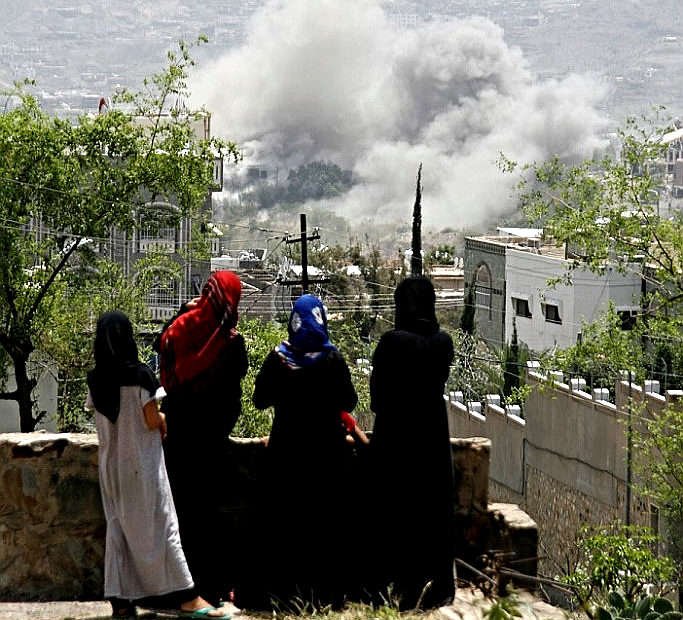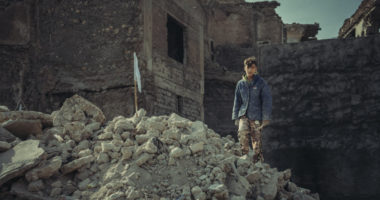Earlier this month Muslims in the Middle East and across the world celebrated Eid al-Adha, the Feast of Sacrifice. Those holy days honor the willingness of Abraham to submit to God’s command by sacrificing his son. Yet when God’s angel stopped Abraham’s blade, was it not also an act of preserving human life? Reflections on laws and wars, by Omar Mekky.
When Abraham submitted his will to God, God sent his angel Gabriel to inform him that his sacrifice had already been accepted. Abraham was then asked to slaughter an animal instead of his son. This story, in different versions, is part of the sacred texts and traditions of the three Abrahamic religions. Muslims commemorate this occasion annually, and it is their holiest holiday. So there must be a way to translate this symbolic deed to preserve human life into the reality of our times.
This year, in response to this Islamic tradition, I accompanied my family to the slaughterhouse to attend the process. While watching how this ancient practice is being carried out in our times a multitude of questions and images crossed my mind. I was wondering whether people have forgotten the meaning and purpose of this symbolic act. With people slaughtering each other all around us, even during the Feast of Sacrifice, in Iraq, Syria, Yemen, or Libya – just to name a few.
Armed conflicts across the Middle East have continued to bring death, destruction and suffering in their wake and civilian lives have remained the primary sacrifice of those conflicts. Deliberate attacks against civilians, forced displacement of civilian populations, the destruction of civilian properties and infrastructure vital to the civilian population are just some examples of acts that have been committed on a regular basis by the warring parties, States and non-State armed groups.
Here, the question remains: how can civilian lives be spared from such an unwarranted sacrifice? In the case of Abraham, who was willing to sacrifice the life of his son upon God’s command, Gabriel managed to stop him, also upon God’s command. Likewise, is there any possibility to change the behavior of the parties to the conflicts today? Do we need an angel to do the job for us? Or is there anything that we humans can still do? Are there any modern legislation or commands to substitute for Gabriel’s intervention, which might end or at least limit the bloodshed?
In this article, I have no intention of finding a settlement between competing theories and philosophies of war or the various reasons and justifications behind its existence. My only objective is to verify if there are any credible tools that can influence the behavior of the warring parties during armed conflicts in order to rescue those among the sons of Adam who decide to live in peace and not to take part in the hostilities, but whose ability to choose is too often taken away from them.
Of law and religion
While acknowledging that economic, cultural and political factors are not to be ignored when reflecting on a phenomenon as complex as violence, it is law and religion that are perhaps the most important regulators of human behavior in the Middle Eastern context. Hence, in order to identify the problem, the relevant religious and legal framework of the protection of civilians should be briefly tackled.
Islam – as the religion of the majority of the peoples and states in the Middle East – dictates particular rules and regulations dealing with issues of warfare. The intensive hostilities that marked the early history of Islam placed the Islamic society at the time in the position of receiving revelation, instructions and guidance from Prophet Mohamed and his companions, also on matters of warfare. This led to the establishment of an extensive set of rules and legal precedents that later laid the boundaries of the doctrine of Jihad.
According to the primary sources of Islamic law (Quran and Sunnah), the targeting of civilians and their objects are strictly prohibited. For example, one of the Quranic verses that regulates the conduct of hostilities reads: “Fight in the cause of God with those who fight against you, but do not commit transgression; for God dislikes those who transgress.” (2:190)
In the aftermath of the Second World War, where some 50 million civilians lost their lives, the international community decided to adopt a set of treaties – the 1949 Geneva Conventions and their Additional Protocols – that sought to limit the effects of armed conflict. Among these are provisions which prohibit the targeting of civilians who do not directly participate in hostilities, as well as their properties. They also provide that civilians must be treated humanely and protected against all forms of violence and degrading treatment, including murder and torture. This protection also extends to those trying to help them, in particular medical units and humanitarian or relief bodies providing essentials such as food, clothing and medical supplies. Since the law prohibits neither the targeting of military objectives nor the combatants or those who directly participate in hostilities, it continues to reflect a reasonable and pragmatic balance between the demands of military necessity and those of humanity.
Today the principles and rules of these treaties – commonly referred to as international humanitarian law (IHL) or the laws of armed conflict – have become universal, making them legally binding in all countries throughout the world.
Having said that, one might wonder where the problem lays if the two dominant influential factors are sufficiently and positively present in the Middle East? Why are the laws of war not being respected by the warring parties?
Humanitarian challenges in the Middle East
Sadly, there are various practical challenges to ensuring the law is respected by all parties.
The most pertinent challenge to the protection of civilians during armed conflicts is the urban nature of the current theater of operations in the Middle East. In such type of warfare artillery and aerial bombardments of military objectives located in cities are obviously complicated by the proximity of those objectives to the civilian population and civilian objects. Moreover, the fact that most conflicts in the Middle East today are asymmetric in nature, with significant disparities between the military capacities of the warring parties, implies that the weaker party may do whatever it takes to find a way around the adversary’s military strength. These tactics may include mingling combatants and military objectives with the civilian population and civilian objects, and using civilians as human shields. Such practices evidently increase the risk of incidental civilian casualties and damage.
Furthermore, the blurred distinction between civilian and military functions, the intermingling of armed actors with the civilian population, the wide variety of tasks and activities performed by civilians in contemporary armed conflicts and the complexity of modern means and methods of warfare have caused confusion and uncertainty as to how to distinguish between combatants and civilians. These challenges are further aggravated wherever armed actors do not distinguish themselves from the civilian population, such as during the conduct of covert military operations or when persons act as ‘farmers by day and fighters by night’. As a result, civilians are more likely to fall victim to erroneous or arbitrary targeting.
The above-mentioned development on the nature of armed conflict have opened the door to enormous, and sometimes opportunistic, misinterpretations of the Laws of War, be it by states or non-State armed groups. Today, many warring parties loosen or tighten the interpretation of some legal concepts in accordance with their political objectives in order to legitimize their approach to the conduct of hostilities. An example is the inaccurate interpretation of the notion of ‘direct participation in hostilities’ by various States and by some armed groups in the Middle East. Unfortunately, once this misinterpretation takes place, it rarely, if ever, has an impact on the opposing side alone. It is often only a question of time before one’s own civilians are exposed to the wicked effects of reciprocal misinterpretation by the adversary.
Moreover, the flagrant lack of knowledge about the law in the Middle East significantly impedes any efforts to increase the respect for the law and to regulate the behavior of the warring parties. This is compounded by the failure of the international community to create any law with respect to an implementation or enforcement mechanism, other than the International Criminal Court (ICC) that seems to be paralyzed to a great extent in this part of the world (with the exception of the Libyan case).
It is also important to mention that several armed groups in the Middle East in particular those who consider themselves as jihadist, apparently perceive international law as an imperial tool imposed by western States to dominate Muslim or non-Western countries, and regard divine Law – in their particular interpretation – as the only binding framework for the way they conduct hostilities.. At the same time, it is very common that States reject the applicability of the law for various reasons. For example, they might disagree that a particular situation qualifies as an armed conflict – as IHL only applies in times of armed conflict. They might claim instead that it is a situation of internal tension or terrorist activities that do not amount to a non-international armed conflict. The rationale is that the recognition that such an armed conflict is taking place would, in some States’ view, implicitly grant legitimacy to the armed group. Inversely, not classifying a given situation as an armed conflict would allow them to apply other favored legal frameworks, including counter-terrorism legislation.
Speaking the Middle-Eastern lingua franca
It is evident for everyone who knows enough about Middle Eastern politics that the Laws of War cannot be simply delivered in their integral, ‘pre-packaged’ form to either States or non-State armed groups. There is an ongoing need to reassess the effectiveness of existing rules for the protection of civilians and civilian objects, to avoid exclusion in applicability, and to improve the implementation of those rules or to clarify the interpretation of specific concepts on which the rules are based.
Furthermore, the communication of the law has to be strategically contextualized to adapt to the nature of the conflicts and the parties’ interests, motivations and ideologies. The warring parties have to first understand why it is better for them to abide by such laws, through appealing to their interests, be it military advantage, reciprocal respect, immunities, or adherence to cultural or religious values that are compatible with the Laws of War.
The discussions and negotiations should also be facilitated with effective means of communication that resonate with all parties. Indeed the interaction with both States and non-State armed groups should be conducted with a lingua franca that is familiar to them, while being grounded in key rules that are common to humanity.
Over the last years, the ICRC has developed robust collaborations with prominent Islamic institutions and scholars in the Middle Eastern and wider Muslim World. The purpose of such collaboration is to explore the common humanitarian grounds between Islamic law and International law, with the purpose of making use of the Islamic precepts in generating better respect for the essential humanitarian rules in war. While it is too early to measure the level of success of the ICRC approach in this regard, one can tell that it significantly contributed in overcoming misperceptions on both sides, and in creating a very constructive dialogue with various warring parties across the Middle East. This is an indispensable step to reaching to the ultimate goal, namely, ensuring respect for the law by all parties to the conflict.
Today one can fairly say that if the international community does not adopt new means of conveying the message to the warring parties, civilians will keep paying the price of these conflicts. I believe none of us want to be part of an international community that submits to those who sacrifice the souls of civilians. Humanity would not have forgiven Abraham had he slaughtered his son after he was advised not to do so. Given all the Laws of War at our disposal, would humanity forgive us for the bloodshed taking place in the Middle East today? The solution is in our hands and it is not an animal to sacrifice, but a law that should be taken out of the books and shaped to stand still against any unwarranted sacrifice.
Omar Mekky, ICRC Regional Legal Coordinator for the Middle East and North Africa. Judge at the Egyptian Primary Courts (on Leave). PhD candidate in International Law, The Graduate Institute of International and Development Studies, Geneva.
Related content
- Syria: Attack on humanitarian convoy is an attack on humanity – ICRC statement, 20 September 2016
- International humanitarian law in the Middle East: Successes and challenges – ICRC conference (video and report), 10 June 2016
- International humanitarian law and the challenges of contemporary armed conflicts – ICRC report, October 2015
- Generating respect for the law – ICRC event series (videos and reports), 2015-2016
- Sheikh Wahbeh al-Zuhili, “Islam and international law”, International Review of the Red Cross, Vol. 87, No. 858, June 2005.






Comments